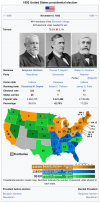1892 Presidential Election:
With debates about currency, tariffs, and the recent Panic being front of mind for most voters, the campaign centered around economic arguments. Harrison defended his protectionist and bimetallist policies as bolstering the industrial and agrarian sectors respectively, and wishing to extend both further. Bayard came out strongly against tariffs and bimetallism, advocating the same Gold Standard position as Cleveland. Bayard was strongly opposed to the Lodge Bill and black civil rights, making numerous racist remarks during the campaign in his speeches across the South. This was far more problematic among Northern voters than when Cleveland had done similarly given Bayard’s history as a Confederate sympathizer and drawl in his accent. Gresham for his part tried to distinguish his campaign by focusing on issues outside the mainstream, like taking on monopolies, Land-Value Tax, reducing work hours, and nationalizing rail, banks, telegraph lines, & mail. On the mainstream issues, Gresham took a more radical bimetallist position, advocated low tariffs, and was in favor of black civil rights. The campaign was overall tepid with minimal mudslinging between candidates. The campaign ended abruptly two weeks before election day, when on October 25 First Lady Caroline Harrison died, having suffered poor health her entire life and a deep bout of tuberculosis the last 6 months of her life. Benjamin Harrison would not appear publicly during or immediately after the election, spending time with his son and daughter.

Results:
444 Electors, 223 needed for a majority
Turnout: 76.2% — (12,753,583 votes)
Benjamin Harrison/Chauncey Depew (Republican): 234 EV, 39.91% of the popular vote — 4,984,705 votes
Thomas Bayard/Robert Pattison (Democratic): 118 EV, 42.76% of the popular vote — 5,341,496 votes
Walter Gresham/James G. Field (Labor, People’s, & Prohibition): 92 EV, 17.22% of the popular vote — 2,149,582 votes
Benjamin Harrison had lost the popular vote to Thomas Bayard by more than 350,000 votes and regardless won an electoral vote majority and the presidency. Walter Gresham largely drew his votes from former Democratic voters, especially in the Midwest, where the rural and urban working classes were put off by Thomas Bayard. Particularly notable was just how narrow this election was on the state level, with the results of 6 separate states being determined by less than a percentage point of the vote. It’s been predicted that had Gresham never entered the race, Bayard could have easily won the election. This theory is supported by the congressional results, which seemed to reflect a continued firmly Democratic national mood. Gresham’s strong overperformance would get the National parties on the ballot in every state, with both the People’s and Labor parties setting up state affiliates in each state
1892 House Election:
Results:
356 Representatives, 179 needed for a majority
Democrats: 187 seats, 44.1% of the vote (-34)
Republicans: 109 seats, 40.2% of the vote (+29)
Nationals: 60 seats, 16.4% of the vote (+29)
People’s Party: 40 seats, 10.3% of the vote (+20)
Labor: 17 seats, 4.5% of the vote (+6)
Prohibition: 2 seats, 0.4% of the vote (+2)
Silver Party: 1 seat, 0.008% of the vote (+1)
Charles F. Crisps’s Democrats were reduced to a slim 8-seat majority, losing 35 races even as the House added 24 new seats due to reapportionment, even still, the Democrats remained the largest party by a wide margin. The small Democratic majority and Harrison’s re-election meant compromise would be necessary on any given policy, and with Crisp not willing to negotiate on the tariff issue, addressing the silver/gold debate once more seemed likely. Even as the Republicans expanded their caucus, the headline was again the shocking growth of the People’s Party, particularly in the South, where they gained 11 new representatives across states like Arkansas, North Carolina, and Alabama. The People’s Party would also gain the governorships of Kansas, Nebraska, Pembina, North Carolina, South Carolina, Colorado, Minnesota, and Alabama, beginning prolonged fights with often combative state legislatures.
The new National MCs were:
AL-5: Albert T. Goodwyn
AL-8: Milford W. Howard
AR-3: Isom Langley
AR-5: Jacob P. Carnahan
CA-4: James G. Maguire
CO-1: Lafayette Pence
CO-2: John C. Bell
GA-7: Seaborn Wright
IA-11: Sylvester B. Crane
ID At-Large: Frank Steunenberg
IN-13: Benjamin Shively
LA-3: John N. Pharr
MN-7: Kittel Halvorson
MS-4: Frank Burkitt
NC-1: Harry Skinner
NE-3: Samuel Maxwell
NE-4: William L. Stark
NV-At Large: Francis G. Newlands
NY-13: Edward McGlynn
NY-25: Ralph Beaumont
OH-21: Tom L. Johnson
PA-3: Rudolph Blankenburg
PA-14: Silas S. Swallow
SC-3: Benjamin Tillman
TN-7: Edward H. East
TX-7: Charles W. Macune
VA-7: James G. Field
Second Benjamin Harrison Cabinet:
A beleaguered President Harrison would keep his cabinet largely intact from his first term, having proudly appointed secretaries based on merit and not patronage or political favors. In a transparent concession to the Stalwarts, Harrison would fire Treasury Secretary Charles Foster and have him replaced by New York Republican boss Thomas C. Platt, promising Foster a Senate seat in Ohio whenever one became available.
Vice President: Chauncey Depew
Secretary of State: John W. Foster (Replaced Blaine in Feb. 1892)
Secretary of the Treasury: Thomas C. Platt (Replacing Charles Foster)
Secretary of War: Stephen B. Elkins (Replaced Proctor in Nov. 1891)
Attorney General: William H. H. Miller
Postmaster General: John Wanamaker
Secretary of the Navy: Benjamin F. Tracy
Secretary of the Interior: John W. Noble
Secretary of Agriculture: Jeremiah M. Rusk
Harrison had barely wanted to run for a second term at all and thus spent much of the transition period before his second inauguration on vacation in the Adirondacks. Unfortunately for the depressed President Harrison, he would be rushed back to Washington in February with reports that the worst economic recession in all of American history up to that point had just begun…
